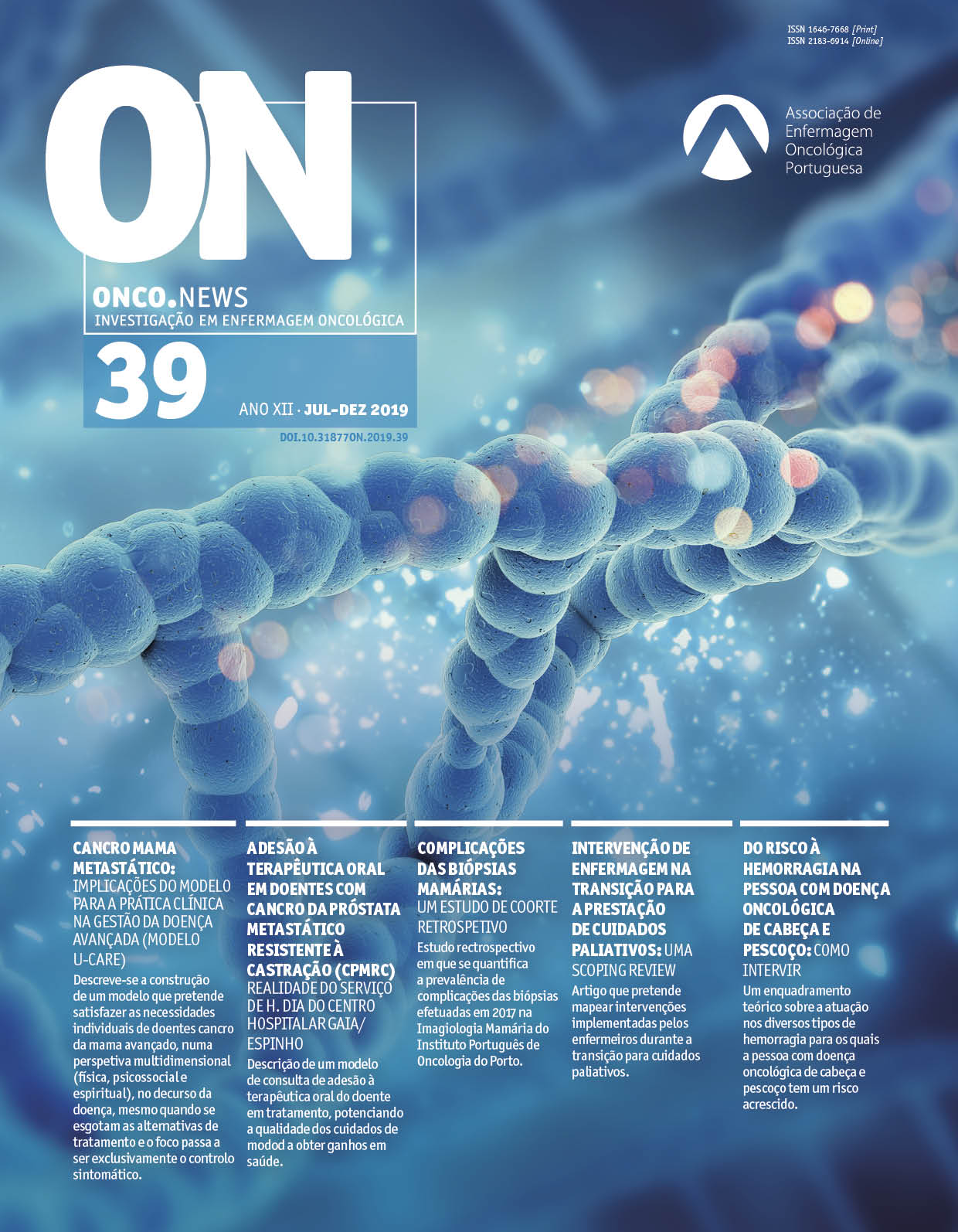Metastatic Breast Cancer: Implications of the Model for Clinical Practice of Advanced Disease Management (U-Care Model)
Keywords:
Advanced breast cancer, Care modelAbstract
From the diagnosis of needs in this group of patients, with the work of a large group of experts in the area, an intervention model called U-Care was created. This model defines a program that aims to satisfy individual needs, from a multidimensional perspective (physical, psychosocial and spiritual), in the course of the disease, even when treatment alternatives are exhausted and the focus becomes exclusively symptomatic control. This model may also contribute to fill the gap that exists in nursing practice regarding the adoption of new methodologies and tools to support advanced breast disease, reducing the patient’s suffering and the physical and psychosocial symptomatic burden.
Downloads
References
Cardoso, F., Senkus, E., Costa, A., Papadopoulos, E., Aapro, M., André, F., … Winer, E. P. (2018). 4th ESO-ESMO International Consensus Guidelines for Advanced Breast Cancer (ABC 4). Annals of Oncology: Official Journal of the European Society for Medical Oncology, 29(8), 1634-1657.
Cipolleta, S., Simonato, C., & Faccio, E. (2019). The Effectiveness of Psychoeducational Support Groups for Women With Breast Cancer and Their Caregivers: A Mixed Methods Study. Frontiers in Psychology, 10, 288. doi:10.3389/fpsyg.2019.00288.
Ferlay J, Ervik M, Lam F, et al. Global Cancer Observatory: Cancer Today. Lyon, France: International Agency for Research on Cancer, 2018. Disponível a partir de: https://gco.iarc.fr/today. Acedido a 10 de Outubro, 2019.
Kandan-Lottick, M.S., Vanderwerker, L.C., Block, S.D. Zhang, B., & Prigerson, H.G. (2005). Psychiatric disorders and mental health service use in patients with advanced cancer: a report from the coping with cancer study. Cancer, 104(12), 2872-2881.
Lopresti, M., Rizack, T., & Dizon, D.S. (2018). Sexuality, fertility and pregnancy following breast cancer treatment. Gland Surgery, 7(4), 404-410. doi: 10.21037/gs.2018.01.02.
Miller, K., & M., Massie. (2010). Depressive Disorders. In J. Holland, W. Bretbart, P. Jacobsen, M. Lederberg, M. Loscalzo & R. McCorkle (eds.), Psycho-Oncology (2nd Ed.) (pp.311). New York: Oxford University Press.
Mosher, C. E., Johnson, C. , Dickler, M. , Norton, L. , Massie, M. J. and DuHamel, K. (2013), Living with Metastatic Breast Cancer: A Qualitative Analysis of Physical, Psychological, and Social Sequelae. The Breast Journal, 19: 285-292. doi:10.1111/tbj.12107.
Downloads
Published
How to Cite
Issue
Section
License
Copyright (c) 2019 Ana Bártolo, Elisabete Valério, Sara Monteiro, Sandra Ponte, Patricia Lourenço, Ana Paula Amorim, Cristina Ferreira, Anabela Amarelo, Susana Pedro, Jorge Freitas

This work is licensed under a Creative Commons Attribution-NonCommercial-ShareAlike 4.0 International License.




